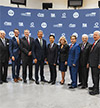Communities Finding Labor Asset in Displaced Workers
After suffering mass layoffs, locations are leveraging their displaced labor pools to entice new businesses to set up shop.
2011 Directory

"Several reports indicate a large number of standing vacancies in the U.S. economy," says Peter Cappelli, professor of management and director of the Center for Human Resources at the Wharton School of Business. "About 2 percent of all jobs in the United States are currently vacant. From what I've seen, these are not entry-level jobs. The skills that are in short supply are work-based skills, the kind that are only learned on the job - experience with these vendors, knowledge of these work practices, an understanding of this industry."
Companies expect most future positions to require additional education and training, another study shows. And the Business Roundtable, an association of chief executives of major corporations, reports that 62 percent of members say they have difficulty finding qualified applicants to fill vacancies. Many also say that at least 16 percent of their work forces have skill gaps that burden productivity.
"This shortage of qualified employees has had, and continues to have, a negative impact on businesses," says Donna Steffy of Global Human Resources Outsourcing. "As a significant percentage of the jobs that are opening up are in fields such as advancing technologies, medicine, clean-energy research, biotech, and engineering, many companies are struggling to gain access to a job pool with the required skill sets."
So how do companies find the skilled employees they need?
Many communities have large numbers of highly skilled, displaced workers due to facility closures and layoffs. But the availability of hundreds or thousands of available workers from a similar industry with the right skills could actually attract companies considering relocations or expansions.
Ready-to-Go Work Forces
"For companies considering new manufacturing operations in the United States, the states that have been hardest hit with unemployment are the same states that recorded the highest percentage of manufacturing employees before the recession," says Buzz Canup, founder and president of Canup & Associates. "North Carolina, Tennessee, South Carolina, Alabama, Mississippi, and Kentucky have unemployment rates of 10 percent or higher, which includes a surplus of workers with manufacturing experience. Similar downturns in manufacturing have occurred in Oregon, Washington, California, Nevada, Ohio, Illinois, Michigan, and Indiana. These states have always been prime sites for manufacturing companies and will be even more attractive over the coming months."
Several Indiana communities have proactively marketed their unemployed workers. Elkhart suffered heavy job losses after the RV industry collapsed several years ago, but has since attracted new businesses. Electric car manufacturer Think North America will invest more than $43 million in an automotive assembly plant there that will create 415 direct jobs and up to 4,500 ancillary jobs by 2013. The city's ready and able work force was a top draw for the company.
In October, the Indiana Economic Development Corporation announced $725,000 in performance-based tax credits and up to $50,000 in training grants to Nexus RVS LLC, a new RV maker with its sights set on Elkhart. The company will invest more than $2.8 million to lease and equip a 109,000-square-foot plant there.
"We selected Elkhart because of the enormous knowledge base of both the individual workers and the vast supplier base," says Claude Donati, Nexus president.
Project Announcements
La Colombe Coffee Roasters Expands Norton Shores, Michigan, Operations
02/23/2026
GRVTY Plans Tysons, Virginia, Headquarters Operations
02/23/2026
Hudson Industries Expands Appleton City, Missouri, Operations
02/23/2026
Israel-Based Katz 1899 Plans Dayton, Ohio, Manufacturing Operations
02/23/2026
Chick-fil-A Supply Plans Winter Haven, Florida, Logistics-Distribution Operations
02/17/2026
Annandale Millwork and Allied Systems Plans Newport News, Virginia, Operations
02/17/2026
Most Read
-
Top States for Doing Business in 2024: A Continued Legacy of Excellence
Q3 2024
-
Data Centers in 2025: When Power Became the Gatekeeper
Q4 2025
-
Speed Built In—The Real Differentiator for 2026 Site Selection Projects
Q1 2026
-
Preparing for the Next USMCA Shake-Up
Q4 2025
-
The New Industrial Revolution in Biotech
Q4 2025
-
Strategic Industries at the Crossroads: Defense, Aerospace, and Maritime Enter 2026
Q1 2026
-
The Skilled Trades Are Ready for a Digital Future
Q4 2025



